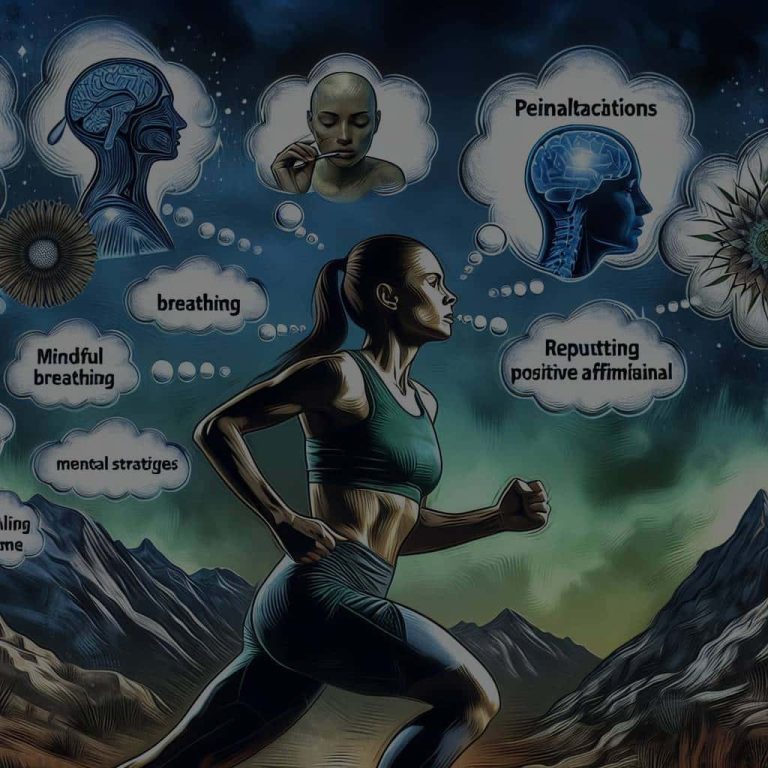Meditation for Mental Toughness in Ultra-Cycling
Introduction
Ultra-cycling is one of the most challenging sports, pushing athletes to their mental and physical limits.
To conquer vast distances, cyclists need more than just physical strength; they require mental toughness.
Meditation has emerged as a vital practice to enhance mental toughness, offering numerous benefits like improved Focus and Stress Reduction.
Incorporating mindfulness techniques can significantly optimize cycling performance metrics and offer resilience during daunting rides.
This article delves into the transformative power of meditation for ultra-cyclists seeking that extra edge.

Meditation and Focus: The Cyclist’s Edge
Meditation is not just about relaxation; it’s a tool for building unparalleled focus, crucial for ultra-cyclists. When riding for hours, maintaining concentration can become a Herculean task. Meditation fosters a deep state of mindfulness where cyclists learn to focus on the present moment.
By practicing meditation, cyclists can train their minds to block out distractions and hone in on the task at hand, whether that’s navigating a tricky descent or conserving energy for the last sprint. Simple meditation practices like focusing on one’s breath can yield substantial improvements in concentration and cognitive strength, essential for peak performance.
Breath Control Techniques
Breath control is a cornerstone of meditation and crucial for maintaining rhythm and focus in cycling. Techniques such as diaphragmatic breathing can effectively enhance oxygen flow, boosting endurance. When climbing steep hills or pushing against the wind, breath control helps regulate effort and maintain calmness.
Training sessions that integrate breath control exercises into cycling routines enhance overall stamina, making tough rides more manageable.
Building Endurance and Resilience through Meditation
Meditation plays an integral role in building mental endurance and resilience. Ultra-cycling demands long periods of sustained effort, where mental fatigue can hit even the most seasoned cyclists. Through meditation, athletes build the resilience needed to persevere through pain and fatigue.
Visualization techniques are valuable here. Cyclists can imagine themselves conquering a challenging route, visualizing every detail from the sound of their wheels on the pavement to the wind brushing past them. This mental rehearsal prepares the mind and body for the physical demands of Ultra-cycling, enhancing both mental clarity and endurance.
Training Techniques for Cyclists
Integrating meditation with traditional training techniques amplifies results. Interval training, a popular endurance training method, can be more effective when paired with meditation sessions. During intervals, cyclists can practice mindfulness to stay present and focused, improving their performance output.
Cyclists should consider incorporating short meditation sessions before and after training to harness the synergy of both mental and physical preparation. This holistic approach leads to better endurance and more consistent performance levels.
Mental Clarity and Stress Reduction
Mental clarity is essential for navigating the physical and strategic challenges inherent in ultra-cycling. Consistent meditation practice helps cyclists clear their minds, letting them make better decisions throughout their journey. Whether it’s choosing the best line on a trail or strategizing nutrition intake, mental clarity can be the difference between success and failure.
Moreover, meditation is a proven stress reduction technique. The intense moments of a race can elevate stress levels, affecting performance. Mindfulness practices help in emotional regulation, allowing cyclists to remain composed and execute their strategies under pressure.
Cycling Cadence and Performance Metrics
Maintaining a consistent cycling cadence is essential for optimum energy expenditure. Meditation teaches patience and pacing, critical when adhering to a steady cadence. By using mental visualization, cyclists can synchronize their pedaling rhythm with their breath, maximizing efficiency.
Utilizing performance metrics, like heart rate and power output data, in conjunction with meditation fosters a deeper understanding of one’s physical state, enabling more informed adjustments during rides.

Emotional Regulation and Cognitive Strength
Cycling over extended periods can lead to emotional fluctuations. Negative emotions may surface, potentially derailing performance. Meditation aids in emotional regulation, providing athletes with tools to navigate these moments.
Developing cognitive strength through meditation allows cyclists to stay mentally sharp, managing the psychological toll of ultra-cycling. Cognitive resilience enables cyclists to adjust tactics as required, turning setbacks into opportunities for growth and learning.
Recovery and Inner Peace
Recovery is vital in ultra-cycling. Post-ride meditation can expedite recovery by promoting relaxation and reducing muscle tension. Meditation encourages a flow state, where mental and physical recovery is optimized, leading to quicker return to peak condition.
Achieving inner peace through meditation can profoundly impact an athlete’s perspective, promoting a healthy balance between competition and personal growth. This attitude fosters a sustainable approach to ultra-cycling, one where mental and physical health are priorities.
Performance Enhancement through Mental Training
Mental toughness is not innate; it is cultivated. Meditation is a form of mental training that bolsters performance enhancement. Developing mental toughness through deliberate meditation practice translates directly into a better racing mindset.
By embracing meditation, ultra-cyclists tap into an invaluable resource, enhancing focus, endurance, and resilience—all necessary for conquering long distances and difficult terrains.
Advanced Techniques for Success
For advanced cyclists, incorporating power-based training with meditation offers a competitive edge. Monitoring VO2 max and utilizing power meters alongside meditation provides data-driven strategies for continuous improvement.
Cyclists who consistently refine their mental training practices find themselves better prepared for the varied demands of ultra-cycling, ultimately leading to improved outcomes and personal victories.
Conclusion
Meditation is a transformative tool for cyclists, cultivating the mental toughness required for ultra-cycling. It fosters focus, resilience, and emotional regulation, all of which are crucial for successful rides. Whether you’re seeking to improve endurance or striving for better performance metrics, integrating meditation into your routine provides numerous benefits.
Embrace these practices and experience the enhanced mental clarity and strength that propel you to new heights in your cycling journey. Share your experiences or start meditation to unlock your potential and find inner peace.
FAQs
How can meditation improve my ultra-cycling performance?
Meditation enhances focus, concentration, and resilience, allowing cyclists to better manage fatigue and stress during long rides, ultimately boosting overall performance.
What type of meditation is best for cyclists?
Mindfulness meditation, breath control, and visualization techniques are particularly beneficial for cyclists, fostering mental clarity and improving endurance.
Can meditation help with recovery after cycling?
Yes, meditation promotes relaxation and aids in muscle recovery, reducing tension and stress, which accelerates post-ride recovery.
Is meditation time-consuming to learn for busy cyclists?
Not at all. Short, regular meditation practices, even as brief as five minutes a day, can significantly impact mental toughness and focus, making it accessible for everyone.
Should I meditate during my rides or separately?
Both approaches can be beneficial. Pre-ride meditation prepares you mentally, whereas in-ride mindfulness keeps you focused and post-ride meditation aids recovery.






